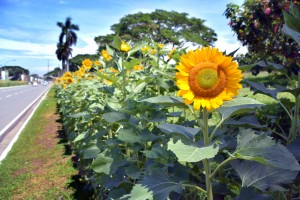By Benito V. Sanvictores Jr., image by Jefferson Villacruz
Certified seed. This is the secret behind the sunflowers at UPD’s recent graduation.
Tasked to ensure there will be sunflowers despite moving the graduation date to June due to the academic calendar shift, Campus Maintenance Office (CMO) Acting Director Alden Jose U. Aynera discussed the matter with his foremen. “We accepted the challenge of planting sunflowers even during the start of the rainy season,” he said.
They consulted with Mr. Emiliano D. Sotalbo, former CMO director and Project Development Associate (PDA) of UPD Chancellor Michael L. Tan. Sotalbo, who is also an adviser for CMO’s forestry concerns, introduced them to certified seeds.
Certified seeds, as defined by Merriam-Webster, are of good quality and established identity verified by an official agency after inspection. These seeds are “high in purity and germination capacity and free from certain pests and diseases,” added Ireland’s Department of Agriculture, Food and the Marine.
Aynera said certified seeds are 100 percent guaranteed to germinate and grow. “Certified sunflowers are slightly rain-tolerant, meaning they are not rain-proof and can still be soaked in rainwater but will be able to survive. Planting should be 60 to 75 days before the blooming of the sunflowers, after which the sunflowers wilt naturally,” he said.
Test planting of the slightly resistant to rain variety started as early as May 2014. Though it is guaranteed that the sunflowers will grow, they were wary if the sunflowers could endure the rains. During the observation period, “the sunflowers were able to survive typhoon Ester in June 2014 and sustain themselves until they bloomed,” Aynera said. It was eureka moment and they came up with the decision to purchase that particular variety.
Uncertified seeds cost approximately P0.05 centavo per seed while certified seeds cost P1.10 each. To work within the approved budget, certified seeds were planted only from the portion of the island near the Oblation Plaza up to the UP Gateway, the Abueva sculpture and its adjacent side pathways. Before, uncertified seeds were planted on the whole stretch of the University Avenue from the Oblation Plaza up to Commonwealth Avenue and its adjacent side pathways.
Their efforts paid off when sunflowers started to bloom during the first weeks of June 2015. “We did not also expect the sunflowers to be six to seven feet tall because the packaging of the seeds indicated that the maximum height will be five feet only,” Aynera said.
There are possibilities to preserve the matured seeds from the certified sunflowers but CMO has no capability for such process and it is also costly. Even with such process, there is also no guarantee that all the extracted seeds will be certified seeds. The best option still, according to Aynera, is to purchase for next year’s graduation.
The planting of the sunflowers started as an experiment of the Campus Landscaping Office and Arboretum (CLOA) under the leadership of Dionisio Liwag, an agriculturist, in the early 1980s, Sotalbo recalled. With certified seeds, rain or shine, future commencement exercises are guaranteed to have sunflowers, an icon of UPD’s graduation and a symbol of hope and dreams.

